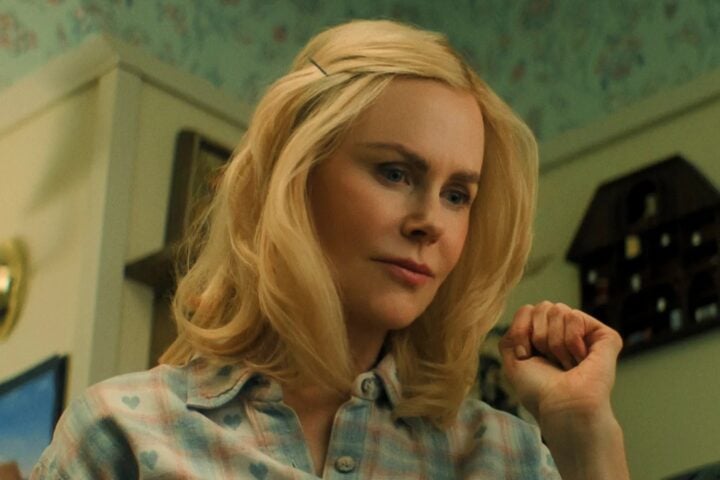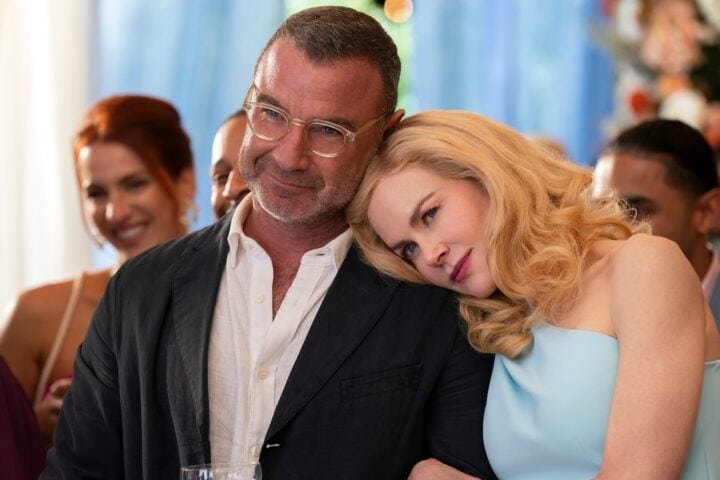Compared to the more rigid constraints imposed by a traditional TV network series or feature film, streaming provides as little or as much space as necessary to tell a story. But time and time again, this greater freedom results in a lack of concision, a tendency to get lost in the weeds. The latest example is Lulu Wang’s limited series Expats, which attempts to tell a story that might have worked just fine if it weren’t spread across six episodes.
Expats is adapted from Janice Y.K. Lee’s novel The Expatriates, which traces the lives of three American women living in Hong Kong in 2014. The expat community is represented here by Margaret Woo (Nicole Kidman) and Hilary Starr (Sarayu Blue), who live in a luxury apartment building with their husbands and, in Margaret’s case, children. They have live-in “helpers,” and they attend lavish parties even in the midst of tragedy. In the first episode, Margaret throws a birthday bash for her husband, Clarke (Brian Tee), in hopes of distracting herself from the tragic disappearance of her youngest child, Gus (Connor James Yuet Hei Gillman).
The show’s third focal character, Mercy (Ji-young Yoo), is quite unlike Margaret and Hilary, as she’s much younger and living in a dingy apartment. She’s part of the catering staff for Margaret’s soiree, and it’s there that their history with one another resurfaces.
For its first four episodes, Expats observes the intersection of these women’s lives as well as the upheaval that follows. Margaret is lost in her grief, determined that Gus is still out there somewhere, even as everyone, including Clarke and her other children, urge her to move on and accept that he will never be found alive. Hilary’s marriage erodes, as she resists her husband David’s (Jack Huston) sudden interest in having kids. Mercy, meanwhile, self-sabotages her relationships, fixated on the idea that she’s been “cursed” to be unlucky from birth.
Under Wang’s assured direction, the series works for a while. It’s often quite pretty to look at, unfolding in long takes across picturesque backdrops that alternate between the bustle of Hong Kong’s general populace and the decadent environs of its upper class. Expats is very much the sort of series meant to get by on mood rather than audacious plot developments or soapy intrigue. But that mood is tough to sustain when the story has so little going on.
As the characters drift through their lives, they seem almost determined to stew in their misfortune. The evocation of their listlessness is certainly intentional, and while that might have sustained a film or a single episode or two of a series, no amount of intentionality can shake the tedium of this depiction across six episodes. By the time the fourth episode traps several characters in waiting rooms and elevators so that they can monologue their feelings at each other, nobody says much of anything that hasn’t already been made glaringly apparent.
These women don’t necessarily ring false—they’re just so thinly depicted that you can practically see right through them. Everything about their moneyed self-absorption or their conflicted desire for independence is obvious from the beginning, and the numbing repetition feels like poor compensation for inert plotting and a general struggle to dramatize the characters’ turmoil.
Hilary’s marital strife is relatively low-stakes, but it’s far and away the most fully realized conflict in the series, in large part because we actually get to watch her marriage erode before our eyes, especially in moments where David provides a physical outlet for her ire. What Margaret and Mercy are going through is more intangible, resistant to depiction except through various shots of them staring into the distance while the camera pushes in on their faces and a ringing noise drowns out the sound of their surroundings. We’re stuck watching them lumber through the aftermath, revealing nothing while rehashing everything.
On some level, Expats seems to understand just how stagnant its central characters become. The show’s lengthy fifth episode expands the canvas and foregrounds other characters, most notably the women who spend the other episodes laboring in the background: Essie (Ruby Ruiz), who takes care of Margaret’s children, and Puri (Amelyn Pardenilla), who attends to Hilary and David. The episode is a bracing change of scenery and perspective, but it comes too late and speaks to the show’s formless, meandering quality. Rather than doing much with these characters earlier on, Expats uses a feature-length episode to finally establish their interiority.
If anything, the fifth episode feels like Expats apologizing for being another series about the inner lives of the wealthy. It touches on the political backdrop of Hong Kong, but does so in the vaguest of ways, with none of the assured over-emphasis visited upon its other themes. Despite having entirely too much time on its hands, Expats only tentatively steps outside of its bubble.
Since 2001, we've brought you uncompromising, candid takes on the world of film, music, television, video games, theater, and more. Independently owned and operated publications like Slant have been hit hard in recent years, but we’re committed to keeping our content free and accessible—meaning no paywalls or fees.
If you like what we do, please consider subscribing to our Patreon or making a donation.






